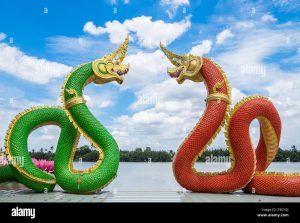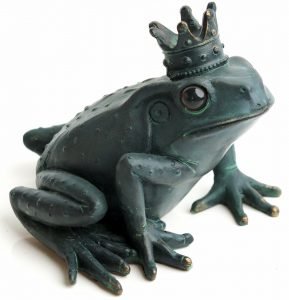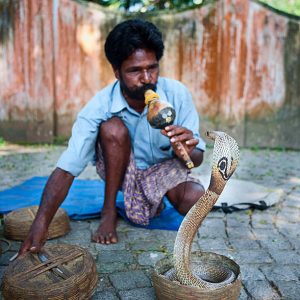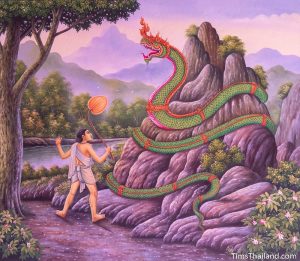This week our family group was studying the parami of Sīla. We started by asking the question, “What is Sīla?” The adults were able to chime in with a few ideas. What do you think? How would you describe Sīla to one who had never heard the word?
When we did this, a lot of definitions involved the word ‘rules’. In fact, sīla is a special kind of ruleset. Our sīla involves rules we voluntarily take on for the sake of peace for ourselves and others. It involves letting go of activities we know to be harmful. The result is greater peace, confidence, and security.
A great example of the results of Sīla is to look at the two realms of existence where sīla is most important: the Human Realm and the Animal Realm. The main difference between these two realms, besides amounts of hair and numbers of legs, is that in the Human realm most beings voluntarily follow rules in order to fit in society. In the Animal realm there is no sīla. It is a realm where beings kill each other, take each others things, and have a pretty difficult life for the most part.
As humans we get to have our own house or room and we don’t worry much about having our stuff taken. We can store food and be comfortable when the weather is bad. We can talk with each other and have long conversations because we trust the other person isn’t lying or trying to manipulate us.
We can look at the differences between the two realms and see how this small change in kamma, to follow rules, makes for a big change in quality of life. There are many rules, but the five most important are the Five Precepts.
- Not to kill
- Not to steal
- Not to cheat in relationships or break friendships
- Not to lie or use insults
- Not to take drink or drugs which cause us to lose control
Our story this week is one of the ‘Dasa Jataka’ or Ten Famous Births. It is one of the longest stories in the collection of Jataka stories, and one of the most famous. It details a time late in the Bodhisatta’s quest to become a full Buddha. The portion we looked at with the group was just a portion of it, designed to address some of the parts most relevant to Sīla.
STORY: BHURIDATTA
Characters: Bhuridatta, Hunter, Snake-Charmer, Sudassana, King
NARRATOR: This is the story of one of the great lives of the Bodhisatta while he was trying to develop the parami’s. It is a story about Sīla. In this life the bodhisatta was born as the son of the Nāgā king and was called Bhuridatta. Nāgā’s are a kind of dragon. They are long and thin like snakes, and prefer to live in watery places like rivers, lakes, and the ocean. There they have magical powers and can fly, or change size, or make things appear.
But even though being a dragon sounds cool, it is not all good. Dragons are still considered to be part of the animal realm, and life for an animal is not easy. Most of the time you are hunting for food or trying not to get eaten. When dragons leave their kingdom they become vulnerable. There are flying birds called Garuda’s that eat them, and even powerful animals can be captured or controlled by regular human beings.
The worst part about being an animal is how hard it is to develop the parami’s. This is because animals are very bad at keeping Sīla, like the Five Precepts. Even as a Prince, Bhuridatta saw it was almost impossible to keep the Five Precepts as a Nāgā. The first precept was to not kill, but nāgā’s hunt fish and deer for food! How could he keep that precept?
Also, animals are always taking things from each other. One dragon might try to take another dragon’s things, or their lair, or their partner. When they go on dry land it is very dangerous, so they are always wearing disguises and telling lies.
QUESTIONS: What things make is easier for you to practice the Five Precepts? What things make it harder?
BHURIDATTA: It would be too hard to keep the Five Precepts every day for me! I would die from hunger or lose everything I own. But if I don’t try, I will never have a peaceful life like humans and deva’s. In the human realm they have a practice called the Uposatha. This means they follow the precepts for one day every two weeks. Maybe I can do that?
NARRATOR: So Bhuridatta decided to start keeping the Uposatha and taking the Five Precepts on that day. Because the Nāgā realm was so noisy, he would go to dry land and sit on an anthill all day. He couldn’t eat without hunting, so he would spend the day trying to meditate and think about keeping the precepts.
One day a hunter was out gathering food and discovered Bhuridatta.
HUNTER: AHHHH! A giant snake!!
BHURIDATTA: Good sir, today is the Uposatha. I’m trying hard not to kill or steal or tell lies. So I won’t hurt you. You should know I look like a snake, but I’m really a powerful dragon. Please leave me in peace. Don’t tell anyone I am here.
NARRATOR: For a while Bhuridatta and the Hunter had an agreement. Bhuridatta showed the Hunter and his son the Nāgā world, and the Hunter kept Bhuridatta’s secret.
But one day a Snake Charmer came to town. The Snake Charmer had been trained in using a special spell to capture Nāgā’s and control them. He had a gem he had taken from a Nāgā once. The Hunter recognized the gem from his time in the Nāgā world and knew it granted wishes. He really wanted it!
HUNTER: Oh Snake Charmer – that is a dragon gem. It’s very dangerous! Maybe you should give it to me. I’ll take it and throw it away for you.
SNAKE CHARMER: That’s strange, you say it is dangerous but you look like you really want it for yourself. I don’t believe you! I know this dragon gem is valuable. But how do you know about dragon gems? You are just a simple hunter!
HUNTER: I know these gems because I have seen a Nāgā.
SNAKE CHARMER: If you take me to that Nāgā, I will give you the gem. Deal?
QUESTIONS: Did the Hunter get what he wanted by lying to the Snake Charmer? When we lie do we usually get what we want or does it make things harder?
QUESTIONS: The Hunter promised Bhuridatta he would keep his secret. Is breaking a promise telling a lie? When might breaking a promise be a lie and when might it not be a lie? If you can’t keep a promise you made, what might you do to help the situation?
NARRATOR: The Hunter had begun to think of Bhuridatta as his friend, but when he saw the gem he forgot all about his friendship. He started reminding himself that Bhuridatta was just an animal. Most human’s don’t respect animals and this Hunter was no different. He agreed to the deal and led the Snake Charmer to the anthill. When Bhuridatta came the next day for the Uposatha, the snake charmer was there waiting.
SNAKE CHARMER: I have you now! I will cast a spell to control you! UMA DUMA NAGA LAGA!
BHURIDATTA (to himself): Young dragons are easy to control and are very afraid of spells. This spell is making my scales itch, but that is all. I have been practicing the precepts. I know I am always in control of my actions! I would normally just bite this snake charmer to break his spell, but today is the Uposatha. I have taken the precept not to kill. This must be an opportunity to practice. I will try not to get angry.
NARRATOR: The snake charmer brought out a basket and commanded that Bhuridatta shrink down and get inside. Bhuridatta did. When he was inside the Snake Charmer threw the dragon gem to the Hunter as a reward, but the Hunter dropped it and it disappeared in the sand.
HUNTER: Nooooo!
NARRATOR: The Snake Charmer took the basket and Bhuridatta to the city, where he started a show. He would play a flute and Bhuridatta would come out to show people he was under the snake charmer’s control. Bhuridatta thought that once the snake charmer made some money he would become happy and let him go. But the more money the snake charmer made, the more greedy he got! His shows kept getting bigger and bigger. All this time Bhuridatta tried to practice the parami’s, like Khanti (Patience), Nekkhama (Renunciation), and especially Sīla. He was getting very hungry, and weaker by the day. But he kept trying because he wanted to master keeping the precepts.
QUESTIONS: Animals have much less choice than humans. What are some ways that humans control them or take things from them? Imagine you were an animal – is there any job you would be willing to do for people?
Bhuridatta’s family was very worried about him. Even though it was dangerous, his brothers and sisters all split up to search different places on Earth. His brother, Sudassana, was the one picked to search the beaches. There he found the hunter digging in the sand trying to find the gem. The Hunter panicked when he saw this new Nāgā, but Sudassana roared and cornered him. The Hunter started crying and told all about what he had done. Sudassana got very angry. He changed into a human form to disguise himself then forced the Hunter to lead him to the city.
On this day the Snake Charmer was giving his biggest show ever. Even the King was there. The Snake Charmer played his flute and made Bhuridatta do tricks and fly through the air. That was what was happening when Sudassana arrived. When Bhuridatta saw his brother, he became embarrassed and hid back in the basket. He had been trying to do the right thing, but sometimes that’s hard and he knew his brother wouldn’t understand.
At first Sudassana was so angry smoke came from his ears, but when he stopped to think he realized Bhuridatta must have a good reason for not breaking free. He knew his brother wanted to practice the precepts, but that shouldn’t mean letting someone taking advantage of you. He wondered if there was some way the Nāgā’s could stand up for themselves without being violent.
Sudassana went up to the king.
SUDASSANA: Great King! I see you are letting this Snake Charmer harm a great being for fun. You probably didn’t realize this is no ordinary Nāgā – it is a Prince of the Nāgā Kingdom! Are you trying to start a war?
KING: Who are you to accuse the King? I swear I just came for the show!
SUDASSANA: I am this Nāgā’s brother and also a Prince! You humans have built your cities and polluted our rivers. Because we don’t want to make bad kamma, we have left you alone. But capturing one of our family is going too far! We Nāgā’s don’t have many weapons, but we do have strong magic. We deserve your respect!
NARRATOR: Then, Sudassana pulled a frog out of his hat.
SUDASSANA: This is not a frog, it is my sister transformed to look like a frog. She has a special power in this form! When she gets sad she cries, and her tears are radioactive! If they land on the ground, all plants there will die. If they go in the water, that water will be undrinkable. If they are scattered in the air the air will be poisonous for seven years. Good King! When my sister sees now what you have been doing to her brother, she is going to cry!
KING: Oh no! What can we do?!
SUDASSANA: You should quickly dig a deep hole to contain the tears!
NARRATOR: So the King ordered his guards to dig quickly. As the Princess Frog looked at the basket with Bhuridatta, a tear formed in her eye. The guards finished the hole just in time. Sudassana held his sister over the hole and the single tear fell in. When it hit the ground it went BOOM! so loudly it scared everyone in the crowd. The King came down and knelt next to Sudassana and his sister.
KING: Oh Princess of the Nāgā’s, we humans are sorry to have made you cry! When we mistreated your brother we didn’t know what harm we were doing. I see now your brother could have hurt us at any time but restrained himself. Please forgive us! We will release him immediately, and from this day forth all Nāgā’s in the kingdom are to be treated with kindness and respect!
NARRATOR: When Bhuridatta heard this, he burst out of the basket and grew to his full size, shining with a bright yellow light. He knew his Sīla had helped his kingdom greatly. Everyone cheered to see Bhuridatta happy.
Then Sudassana turned angrily towards the Hunter who betrayed Bhuridatta.
HUNTER: Uh-oh.
SUDASSANA: All of this started because you were a bad friend! I think we should drag you back to the ocean and punish you!
BHURIDATTA: Brother, there is no need. There is no punishment we could give him that would be worse than what this Hunter already feels. He has lost his friend, he lost his gem, and now nobody will trust what he says. Let him stay and live as a reminder of how important it is to live by the Precepts!
The End!





